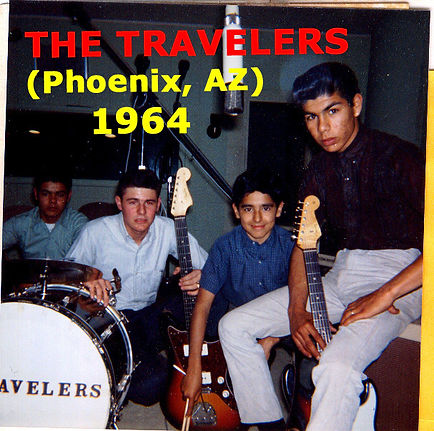ABOUT US
The Chicago Music Store in downtown Tucson was the place to go if you were a musician in search of a band to join. It was here ex-Californian, Ron Story, heard of a local rock & roll group called The Gents. Managed by Herbie Williams, The Gents found themselves in need of a new lead guitarist after the departure of members David Contreras and Tony Trejo. It wasnt long after their initial meeting that 15 year-old, Story, joined The Gents permanently.
In May of 1963, The Gents became The Travelers after laying down an original instrumental titled, "Spanish Moon" at Copper State Recorders. The single was picked up for national release by Vault Records, topping The Beatles on KAFYs Fabulous 55 (Bakersfield, CA) chart for one week in April 1964. The song also made it to #3 on Tucson's KTKT Top Forty. The sweet and romantic melody unfortunately brought controversy to The Travelers after The Ventures renamed it "Tomorrows Love" and released it on their Knock Me Out LP in 1965.
After a legal settlement with Liberty Records, BMI confirmed "Tomorrow's Love" and "Spanish Moon" were two versions of the same song. The Travelers continued to perform in Tucson and throughout Southern Arizona and were given the opportunity to play backup for The Righteous Brothers.
In 1965 the group's name was changed again - this time by Atlantic Records and West Coast producer, John Marascalco. The Travelers became The Ric-A-Shays with the release of their single, "Turn On". A young Harry Nilsson provided the voice heard on the track. Unfortunately, the record never made the charts. "It was a major disappointment, especially considering the fabulous drum work by Freddie Gonzales," says Ron Story.
Eventually, The Travelers/Ric-A-Shays drifted apart after high school. In a booklet that accompanies a CD released in 2002 entitled Think Of The Good Times - The Tucson 60s Sound the writer states: "Although their musical style had become too dated for the mid-Sixties music scene history shows The New Travelers/Ric-A-Shays were ahead of their time, using terms like 'groovy' and 'turn on' in their song titles years before they became hippie-culture catch phrases."
BAND MEMBER BIOS

